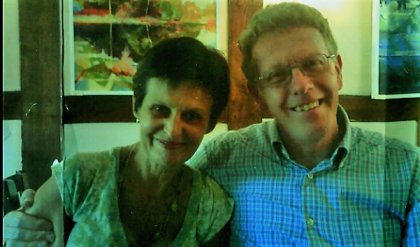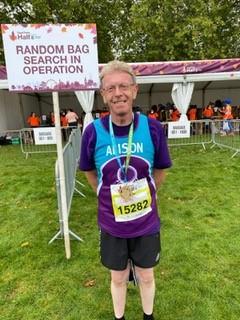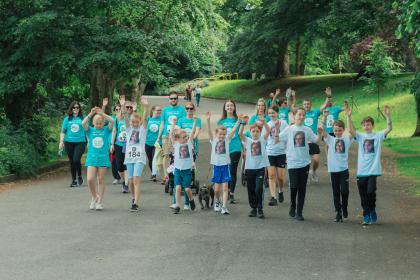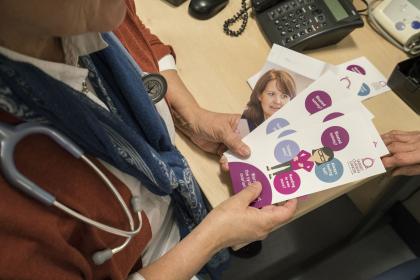There’s so much I could say about Alison. We were married for 38 years, and she was a loving, caring wife and mum and a doting grandma.
Alison was always great fun to be with. She loved cooking – which she was excellent at – and she could often be found with a coffee in one hand and a book in the other. She was always on the go and organised discos over many years to raise funds for the Friends of the School at the school she worked at as a classroom assistant. She was also a great Rod Stewart fan and we saw him over many years at his concerts.
Alison passed away just six weeks after her diagnosis of ovarian cancer, I now know that awareness of the symptoms and GP education is the key to early diagnosis and surviving this disease.

Hysterectomy
Alison had had some gynaecological problems when we were first married which led to the partial removal of her ovaries. Years later she had a total hysterectomy and was free of any issues for 20 or so years.
In 2015 she developed a bit of cough, tiredness and shortness of breath. She visited her GP who found a shadow on her lungs and diagnosed her with pneumonia. After a few weeks of rest and medication nothing improved so she was referred for further X-rays at the hospital which revealed shadows on both lungs. After draining her lungs and further tests she was diagnosed with metastatic peritoneal cancer that began in the ovaries and had spread.
We asked how could this be? She’d had a hysterectomy. The oncologist explained that whilst it’s uncommon, you can develop ovarian cancer after a hysterectomy. I now know this is because microscopic cancer cells may have started to grow in the abdomen (tummy) or pelvis before the hysterectomy took place, and these cells will not have been removed during the operation.
Treatment
The oncology team told us Alison was to begin chemotherapy and there were three drug options they could try. Upon starting the first round of treatment it quickly became clear Alison was experiencing extreme side effects – nausea and exhaustion. She was becoming considerably weaker, and the treatment was having no effect on her cancer.
She was in and out of hospital for a few weeks before the oncology team told us there was nothing more they could do. She came home and passed away ten days later. This was just six weeks after her cancer diagnosis.
Awareness and education
It occurred to me after a few weeks that the best way to combat this disease is to find out about it early on, and the best way to do this is to know what the symptoms are.
Our daughter Katy told me about Target Ovarian Cancer and we learnt about the work they’re doing to raise awareness of symptoms, as well as their work with GPs to educate them and lead to early diagnosis. Alison’s GP incorrectly diagnosed pneumonia and ovarian cancer was never on their radar.
Perhaps if we’d had an early diagnosis Alison would have been in a better position to fight it. But it came too late for Alison and treatment was much more difficult.
The Ovarian Cancer Walk|Run
I thought about how I could work with the charity, and what I could do to support them. I enjoy running and thought a few sponsored runs could make a financial contribution.
I saw the Ovarian Cancer Walk|Run promoted online and thought I’d sign up. I have done a few sponsored runs for Target Ovarian Cancer and will be doing the walk for the fourth time this year. The first time I took part I appreciated how well run it was, and how many friendly people were also taking part. I took part again the next year with friends, and took my family along the year after that.

What’s different about the Ovarian Cancer Walk|Run is that everyone is in the same boat. We’re all doing it for the same reason. It’s set in a fantastic venue at the Olympic Park and it’s nice to see familiar faces every year. It’s well worth the trip to London to take part.
It’s important to me that I support Target Ovarian Cancer and fundraise in Alison’s memory. I was also keen to keep a link to the charity to watch developments in ovarian cancer treatment, care and potential causes, to help better understand how Alison became poorly, and things that may protect our daughter Katy.
We’re walking for a world where no one has to say goodbye to someone they love too soon because of ovarian cancer. Join Colin and hundreds of others at the Ovarian Cancer Walk|Run, as we take steps to raise awareness, fund research and save lives.
JOIN US IN LONDON ON 8 OCTOBER >
JOIN US IN BELFAST ON 6 NOVEMBER >
Or find out more about the Ovarian Cancer Walk|Run in Cardiff or Edinburgh.
If you’ve been affected by this story and would like to speak to a specialist nurse, you can call our dedicated support line on 020 7923 5475 or contact us: [email protected]. We're open from 9am until 5.30pm, Monday to Friday.
If reading this story has helped you, join the Ovarian Cancer Community to connect with more people affected by ovarian cancer: www.targetovariancancer.org.uk/onlinecommunity




